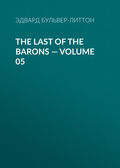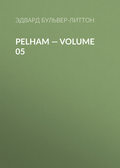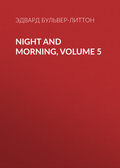
Эдвард Бульвер-Литтон
A Strange Story — Complete
CHAPTER LXXXIV
While we had thus laboured and found, Ayesha had placed the fuel where the moonlight fell fullest on the sward of the tableland,—a part of it already piled as for a fire, the rest of it heaped confusedly close at hand; and by the pile she had placed the coffer. And there she stood, her arms folded under her mantle, her dark image seeming darker still as the moonlight whitened all the ground from which the image rose motionless. Margrave opened his coffer, the Veiled Woman did not aid him, and I watched in silence, while he as silently made his weird and wizard-like preparations.
CHAPTER LXXXV
On the ground a wide circle was traced by a small rod, tipped apparently with sponge saturated with some combustible naphtha-like fluid, so that a pale lambent flame followed the course of the rod as Margrave guided it, burning up the herbage over which it played, and leaving a distinct ring, like that which, in our lovely native fable-talk, we call the “Fairy’s Ring,” but yet more visible because marked in phosphorescent light. On the ring thus formed were placed twelve small lamps, fed with the fluid from the same vessel, and lighted by the same rod. The light emitted by the lamps was more vivid and brilliant than that which circled round the ring.
Within the circumference, and immediately round the woodpile, Margrave traced certain geometrical figures, in which—not without a shudder, that I overcame at once by a strong effort of will in murmuring to myself the name of “Lilian”—I recognized the interlaced triangles which my own hand, in the spell enforced on a sleep-walker, had described on the floor of the wizard’s pavilion. The figures were traced, like the circle, in flame, and at the point of each triangle (four in number) was placed a lamp, brilliant as those on the ring. This task performed, the caldron, based on an iron tripod, was placed on the wood-pile. And then the woman, before inactive and unheeding, slowly advanced, knelt by the pile, and lighted it. The dry wood crackled and the flame burst forth, licking the rims of the caldron with tongues of fire.
Margrave flung into the caldron the particles we had collected, poured over them first a liquid, colourless as water, from the largest of the vessels drawn from his coffer, and then, more sparingly, drops from small crystal phials, like the phials I had seen in the hand of Philip Derval.
Having surmounted my first impulse of awe, I watched these proceedings, curious yet disdainful, as one who watches the mummeries of an enchanter on the stage.
“If,” thought I, “these are but artful devices to inebriate and fool my own imagination, my imagination is on its guard, and reason shall not, this time, sleep at her post!”
“And now,” said Margrave, “I consign to you the easy task by which you are to merit your share of the elixir. It is my task to feed and replenish the caldron; it is Ayesha’s to heed the fire, which must not for a moment relax in its measured and steady heat. Your task is the lightest of all it is but to renew from this vessel the fluid that burns in the lamps, and on the ring. Observe, the contents of the vessel must be thriftily husbanded; there is enough, but not more than enough, to sustain the light in the lamps, on the lines traced round the caldron, and on the farther ring, for six hours. The compounds dissolved in this fluid are scarce,—only obtainable in the East, and even in the East months might have passed before I could have increased my supply.
“I had no months to waste. Replenish, then, the light only when it begins to flicker or fade. Take heed, above all, that no part of the outer ring—no, not an inch—and no lamp of the twelve, that are to its zodiac like stars, fade for one moment in darkness.”
I took the crystal vessel from his hand.
“The vessel is small,” said I, “and what is yet left of its contents is but scanty; whether its drops suffice to replenish the lights I cannot guess,—I can but obey your instructions. But, more important by far than the light to the lamps and the circle, which in Asia or Africa might scare away the wild beasts unknown to this land—more important than light to a lamp, is the strength to your frame, weak magician! What will support you through six weary hours of night-watch?”
“Hope,” answered Margrave, with a ray of his old dazzling style. “Hope! I shall live,—I shall live through the centuries!”
CHAPTER LXXXVI
One hour passed away; the fagots under the caldron burned clear in the sullen sultry air. The materials within began to seethe, and their colour, at first dull and turbid, changed into a pale-rose hue; from time to time the Veiled Woman replenished the fire, after she had done so reseating herself close by the pyre, with her head bowed over her knees, and her face hid under her veil.
The lights in the lamps and along the ring and the triangles now began to pale. I resupplied their nutriment from the crystal vessel. As yet nothing strange startled my eye or my ear beyond the rim of the circle,—nothing audible, save, at a distance, the musical wheel-like click of the locusts, and, farther still, in the forest, the howl of the wild dogs, that never bark; nothing visible, but the trees and the mountain-range girding the plains silvered by the moon, and the arch of the cavern, the flush of wild blooms on its sides, and the gleam of dry bones on its floor, where the moonlight shot into the gloom.
The second hour passed like the first. I had taken my stand by the side of Margrave, watching with him the process at work in the caldron, when I felt the ground slightly vibrate beneath my feet, and, looking up, it seemed as if all the plains beyond the circle were heaving like the swell of the sea, and as if in the air itself there was a perceptible tremor.
I placed my hand on Margrave’s shoulder and whispered, “To me earth and air seem to vibrate. Do they seem to vibrate to you?”
“I know not, I care not,” he answered impetuously. “The essence is bursting the shell that confined it. Here are my air and my earth! Trouble me not. Look to the circle! feed the lamps if they fail.”
I passed by the Veiled Woman as I walked towards a place in the ring in which the flame was waning dim; and I whispered to her the same question which I had whispered to Margrave. She looked slowly around, and answered, “So is it before the Invisible make themselves visible! Did I not bid him forbear?” Her head again drooped on her breast, and her watch was again fixed on the fire.
I advanced to the circle and stooped to replenish the light where it waned. As I did so, on my arm, which stretched somewhat beyond the line of the ring, I felt a shock like that of electricity. The arm fell to my side numbed and nerveless, and from my hand dropped, but within the ring, the vessel that contained the fluid. Recovering my surprise or my stun, hastily with the other hand I caught up the vessel, but some of the scanty liquid was already spilled on the sward; and I saw with a thrill of dismay, that contrasted indeed the tranquil indifference with which I had first undertaken my charge, how small a supply was now left.
I went back to Margrave, and told him of the shock, and of its consequence in the waste of the liquid.
“Beware,” said he, “that not a motion of the arm, not an inch of the foot, pass the verge of the ring; and if the fluid be thus unhappily stinted, reserve all that is left for the protecting circle and the twelve outer lamps! See how the Grand Work advances! how the hues in the caldron are glowing blood-red through the film on the surface!”
And now four hours of the six were gone; my arm had gradually recovered its strength. Neither the ring nor the lamps had again required replenishing; perhaps their light was exhausted less quickly, as it was no longer to be exposed to the rays of the intense Australian moon. Clouds had gathered over the sky, and though the moon gleamed at times in the gaps that they left in blue air, her beam was more hazy and dulled. The locusts no longer were heard in the grass, nor the howl of the dogs in the forest. Out of the circle, the stillness was profound.
And about this time I saw distinctly in the distance a vast Eye! It drew nearer and nearer, seeming to move from the ground at the height of some lofty giant. Its gaze riveted mine; my blood curdled in the blaze from its angry ball; and now as it advanced larger and larger, other Eyes, as if of giants in its train, grew out from the space in its rear; numbers on numbers, like the spearheads of some Eastern army, seen afar by pale warders of battlements doomed to the dust. My voice long refused an utterance to my awe; at length it burst forth shrill and loud,—
“Look! look! Those terrible Eyes! Legions on legions! And hark! that tramp of numberless feet; they are not seen, but the hollows of earth echo the sound of their march!”
Margrave, more than ever intent on the caldron, in which, from time to time, he kept dropping powders or essences drawn forth from his coffer, looked up, defyingly, fiercely.
“Ye come,” he said, in a low mutter, his once mighty voice sounding hollow and labouring, but fearless and firm,—“ye come,—not to conquer, vain rebels!—ye whose dark chief I struck down at my feet in the tomb where my spell had raised up the ghost of your first human master, the Chaldee! Earth and air have their armies still faithful to me, and still I remember the war-song that summons them up to confront you! Ayesha! Ayesha! recall the wild troth that we pledged amongst roses; recall the dread bond by which we united our sway over hosts that yet own thee as queen, though my sceptre is broken, my diadem reft from my brows!”
The Veiled Woman rose at this adjuration. Her veil now was withdrawn, and the blaze of the fire between Margrave and herself flushed, as with the rosy bloom of youth, the grand beauty of her softened face. It was seen, detached as it were, from her dark-mantled form; seen through the mist of the vapours which rose from the caldron, framing it round like the clouds. that are yieldingly pierced by the light of the evening star.
Through the haze of the vapour came her voice, more musical, more plaintive than I had heard it before, but far softer, more tender; still in her foreign tongue; the words unknown to me, and yet their sense, perhaps, made intelligible by the love, which has one common language and one common look to all who have loved,—the love unmistakably heard in the loving tone, unmistakably seen in the loving face.
A moment or so more, and she had come round from the opposite side of the fire-pile, and bending over Margrave’s upturned brow, kissed it quietly, solemnly; and then her countenance grew fierce, her crest rose erect; it was the lioness protecting her young. She stretched forth her arm from the black mantle, athwart the pale front that now again bent over the caldron,—stretched it towards the haunted and hollow-sounding space beyond, in the gesture of one whose right hand has the sway of the sceptre. And then her voice stole on the air in the music of a chant, not loud, yet far-reaching; so thrilling, so sweet, and yet so solemn, that I could at once comprehend how legend united of old the spell of enchantment with the power of song. All that I recalled of the effects which, in the former time, Margrave’s strange chants had produced on the ear that they ravished and the thoughts they confused, was but as the wild bird’s imitative carol, compared to the depth and the art and the soul of the singer, whose voice seemed endowed with a charm to enthrall all the tribes of creation, though the language it used for that charm might to them, as to me, be unknown. As the song ceased, I heard, from behind, sounds like those I had heard in the spaces before me,—the tramp of invisible feet, the whir of invisible wings, as if armies were marching to aid against armies in march to destroy.
“Look not in front nor around,” said Ayesha. “Look, like him, on the caldron below. The circle and the lamps are yet bright; I will tell you when the light again fails.”
I dropped my eyes on the caldron.
“See,” whispered Margrave, “the sparkles at last begin to arise, and the rose-hues to deepen,—signs that we near the last process.”
CHAPTER LXXXVII
The fifth hour had passed away, when Ayesha said to me, “Lo! the circle is fading; the lamps grow dim. Look now without fear on the space beyond; the eyes that appalled thee are again lost in air, as lightnings that fleet back into cloud.”
I looked up, and the spectres had vanished. The sky was tinged with sulphurous hues, the red and the black intermixed. I replenished the lamps and the ring in front, thriftily, heedfully; but when I came to the sixth lamp, not a drop in the vessel that fed them was left. In a vague dismay, I now looked round the half of the wide circle in rear of the two bended figures intent on the caldron. All along that disk the light was already broken, here and there flickering up, here and there dying down; the six lamps in that half of the circle still twinkled, but faintly, as stars shrinking fast from the dawn of day. But it was not the fading shine in that half of the magical ring which daunted my eye and quickened with terror the pulse of my heart; the Bushland beyond was on fire. From the background of the forest rose the flame and the smoke,—the smoke, there, still half smothering the flame. But along the width of the grasses and herbage, between the verge of the forest and the bed of the water-creek just below the raised platform from which I beheld the dread conflagration, the fire was advancing,—wave upon wave, clear and red against the columns of rock behind,—as the rush of a flood through the mists of some Alp crowned with lightnings.
Roused from my stun at the first sight of a danger not foreseen by the mind I had steeled against far rarer portents of Nature, I cared no more for the lamps and the circle. Hurrying back to Ayesha, I exclaimed: “The phantoms have gone from the spaces in front; but what incantation or spell can arrest the red march of the foe, speeding on in the rear! While we gazed on the caldron of life, behind us, unheeded, behold the Destroyer!”
Ayesha looked, and made no reply; but, as by involuntary instinct, bowed her majestic head, then rearing it erect, placed herself yet more immediately before the wasted form of the young magician (he still bending over the caldron, and hearing me not in the absorption and hope of his watch),—placed herself before him, as the bird whose first care is her fledgling.
As we two there stood, fronting the deluge of fire, we heard Margrave behind us, murmuring low, “See the bubbles of light, how they sparkle and dance! I shall live, I shall live!” And his words scarcely died in our ears before, crash upon crash, came the fall of the age-long trees in the forest; and nearer, all near us, through the blazing grasses, the hiss of the serpents, the scream of the birds, and the bellow and tramp of the herds plunging wild through the billowy red of their pastures.
Ayesha now wound her arms around Margrave, and wrenched him, reluctant and struggling, from his watch over the seething caldron. In rebuke; of his angry exclamations, she pointed to the march of the fire, spoke in sorrowful tones a few words in her own language, and then, appealing to me in English, said,—
“I tell him that here the Spirits who oppose us have summoned a foe that is deaf to my voice, and—”
“And,” exclaimed Margrave, no longer with gasp and effort, but with the swell of a voice which drowned all the discords of terror and of agony sent forth from the Phlegethon burning below,—“and this witch, whom I trusted, is a vile slave and impostor, more desiring my death than my life. She thinks that in life I should scorn and forsake her, that in death I should die in her arms! Sorceress, avaunt! Art thou useless and powerless now when I need thee most? Go! Let the world be one funeral pyre! What to me is the world? My world is my life! Thou knowest that my last hope is here,—that all the strength left me this night will die down, like the lamps in the circle, unless the elixir restore it. Bold friend, spurn that sorceress away. Hours yet ere those flames can assail us! A few minutes more, and life to your Lilian and me!”
Thus having said, Margrave turned from us, and cast into the caldron the last essence yet left in his empty coffer. Ayesha silently drew her black veil over her face; and turned, with the being she loved, from the terror he scorned, to share in the hope that he cherished.
Thus left alone, with my reason disenthralled, disenchanted, I surveyed more calmly the extent of the actual peril with which we were threatened, and the peril seemed less, so surveyed.
It is true all the Bush-land behind, almost up to the bed of the creek, was on fire; but the grasses, through which the flame spread so rapidly, ceased at the opposite marge of the creek. Watery pools were still, at intervals, left in the bed of the creek, shining tremulous, like waves of fire, in the glare reflected from the burning land; and even where the water failed, the stony course of the exhausted rivulet was a barrier against the march of the conflagration. Thus, unless the wind, now still, should rise, and waft some sparks to the parched combustible herbage immediately around us, we were saved from the fire, and our work might yet be achieved.
I whispered to Ayesha the conclusion to which I came. “Thinkest thou,” she answered, without raising her mournful head, “that the Agencies of Nature are the movements of chance? The Spirits I invoked to his aid are leagued with the hosts that assail. A mightier than I am has doomed him!”
Scarcely had she uttered these words before Margrave exclaimed, “Behold how the Rose of the alchemist’s dream enlarges its blooms from the folds of its petals! I shall live, I shall live!”
I looked, and the liquid which glowed in the caldron had now taken a splendour that mocked all comparisons borrowed from the lustre of gems. In its prevalent colour it had, indeed, the dazzle and flash of the ruby; but out from the mass of the molten red, broke coruscations of all prismal hues, shooting, shifting, in a play that made the wavelets them selves seem living things, sensible of their joy. No longer was there scum or film upon the surface; only ever and anon a light rosy vapour floating up, and quick lost in the haggard, heavy, sulphurous air, hot with the conflagration rushing towards us from behind. And these coruscations formed, on the surface of the molten ruby, literally the shape of a Rose, its leaves made distinct in their outlines by sparks of emerald and diamond and sapphire.
Even while gazing on this animated liquid lustre, a buoyant delight seemed infused into my senses; all terrors conceived before were annulled; the phantoms, whose armies had filled the wide spaces in front, were forgotten; the crash of the forest behind was unheard. In the reflection of that glory, Margrave’s wan cheek seemed already restored to the radiance it wore when I saw it first in the framework of blooms.
As I gazed, thus enchanted, a cold hand touched my own.
“Hush!” whispered Ayesha, from the black veil, against which the rays of the caldron fell blunt, and absorbed into Dark. “Behind us, the light of the circle is extinct, but there we are guarded from all save the brutal and soulless destroyers. But before!—but before!—see, two of the lamps have died out!—see the blank of the gap in the ring Guard that breach,—there the demons will enter.”
“Not a drop is there left in his vessel by which to replenish the lamps on the ring.”
“Advance, then; thou hast still the light of the soul, and the demons may recoil before a soul that is dauntless and guiltless. If not, Three are lost!—as it is, One is doomed.”
Thus adjured, silently, involuntarily, I passed from the Veiled Woman’s side, over the sere lines on the turf which had been traced by the triangles of light long since extinguished, and towards the verge of the circle. As I advanced, overhead rushed a dark cloud of wings,—birds dislodged from the forest on fire, and screaming, in dissonant terror, as they flew towards the farthermost mountains; close by my feet hissed and glided the snakes, driven forth from their blazing coverts, and glancing through the ring, unscared by its waning lamps; all undulating by me, bright-eyed and hissing, all made innocuous by fear,—even the terrible Death-adder, which I trampled on as I halted at the verge of the circle, did not turn to bite, but crept harmless away. I halted at the gap between the two dead lamps, and bowed my head to look again into the crystal vessel. Were there, indeed, no lingering drops yet left, if but to recruit the lamps for some priceless minutes more? As I thus stood, right into the gap between the two dead lamps strode a gigantic Foot. All the rest of the form was unseen; only, as volume after volume of smoke poured on from the burning land behind, it seemed as if one great column of vapour, eddying round, settled itself aloft from the circle, and that out from that column strode the giant Foot. And, as strode the Foot, so with it came, like the sound of its tread, a roll of muttered thunder.
I recoiled, with a cry that rang loud through the lurid air.
“Courage!” said the voice of Ayesha. “Trembling soul, yield not an inch to the demon!”
At the charm, the wonderful charm, in the tone of the Veiled Woman’s voice, my will seemed to take a force more sublime than its own. I folded my arms on my breast, and stood as if rooted to the spot, confronting the column of smoke and the stride of the giant Foot. And the Foot halted, mute.
Again, in the momentary hush of that suspense, I heard a voice,—it was Margrave’s.
“The last hour expires, the work is accomplished! Come! come! Aid me to take the caldron from the fire; and quick!—or a drop may be wasted in vapour—the Elixir of Life from the caldron!”
At that cry I receded, and the Foot advanced.
And at that moment, suddenly, unawares, from behind, I was stricken down. Over me, as I lay, swept a whirlwind of trampling hoofs and glancing horns. The herds, in their flight from the burning pastures, had rushed over the bed of the watercourse, scaled the slopes of the banks. Snorting and bellowing, they plunged their blind way to the mountains. One cry alone, more wild than their own savage blare, pierced the reek through which the Brute Hurricane swept. At that cry of wrath and despair I struggled to rise, again dashed to earth by the hoofs and the horns. But was it the dream-like deceit of my reeling senses, or did I see that giant Foot stride past through the close-serried ranks of the maddening herds? Did I hear, distinct through all the huge uproar of animal terror, the roll of low thunder which followed the stride of that Foot?







